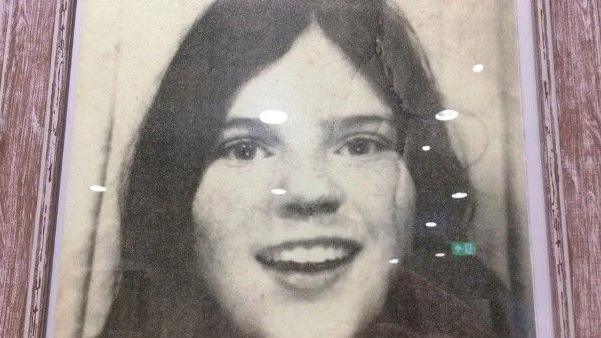PSNI submit file into 1971 killing of schoolgirl

Annette McGavigan, 14, was shot dead during rioting in Derry in 1971
- Published
Police investigating the killing of a Londonderry schoolgirl by the Army in 1971 have submitted a file to the Public Prosecution Service (PPS).
Annette McGavigan, 14, was shot dead during rioting in Derry.
No one has ever been convicted over her death.
Last September, a former British soldier was questioned under caution as part of the police investigation.
The police have now confirmed that a file was submitted to the PPS on 6 February.
A solicitor for the McGavigan family said that a legal letter had also been issued to the PPS calling for a decision on prosecution before the end of March.
The schoolgirl's brother, Martin McGavigan, told ┤¾¤¾┤½├¢ Radio Foyle's North West Today programme that he hoped they would finally have their day in court and the "closure" of an admission that "they've done it".
"If that happened anywhere else in the world ... it's crazy," he said.
"We've lost Annette, we've lost a sister.
"We'll still grieve but it'll help us along the way.
"We'll keep fighting for Annette's case."
The UK's controversial Troubles Legacy Act became law in September, despite opposition from Stormont's political parties and victims' groups.
It offers a conditional amnesty and ends future civil litigation and inquests into deaths which occurred during more than 30 years of violence during the Troubles.
Under the Act, prosecutions that are currently ongoing will continue to conclusion.
Any case after the 1 May deadline would become the responsibility of a new body set up to investigate Troubles-related killings - the Independent Commission for Reconciliation and Information Recovery. (ICRIR).
May and Martin McGavigan holding a photo of their teenage sister, Annette
PPS decision
A number of legal challenges have been brought by victims' groups and families of people who were killed or injured during the Troubles.
Separately, the Irish government is also taking a case against the UK at the European Court of Human Rights in Strasbourg.
The UK government has repeatedly stated the Act is, in its view, human rights compliant.
In February, the High Court in Belfast ruled conditional immunity from prosecutions for Troubles-era crimes, contained in the Act, was in breach of the European Convention on Human Rights.
The McGavigan family have called for the PPS to make a decision in their case as soon as possible.
In a statement to ┤¾¤¾┤½├¢ News NI, the PPS confirmed that the file was submitted by the Police Service of Northern Ireland and has now been allocated to a senior public prosecutor for consideration.
A PPS spokesperson said that a decision will be issued "as soon as possible after a thorough consideration of all evidenceÔÇØ.